Black History Month
artwork by Taja Carey
Issue IV
The St. Anne’s-Belfield Student Newspaper
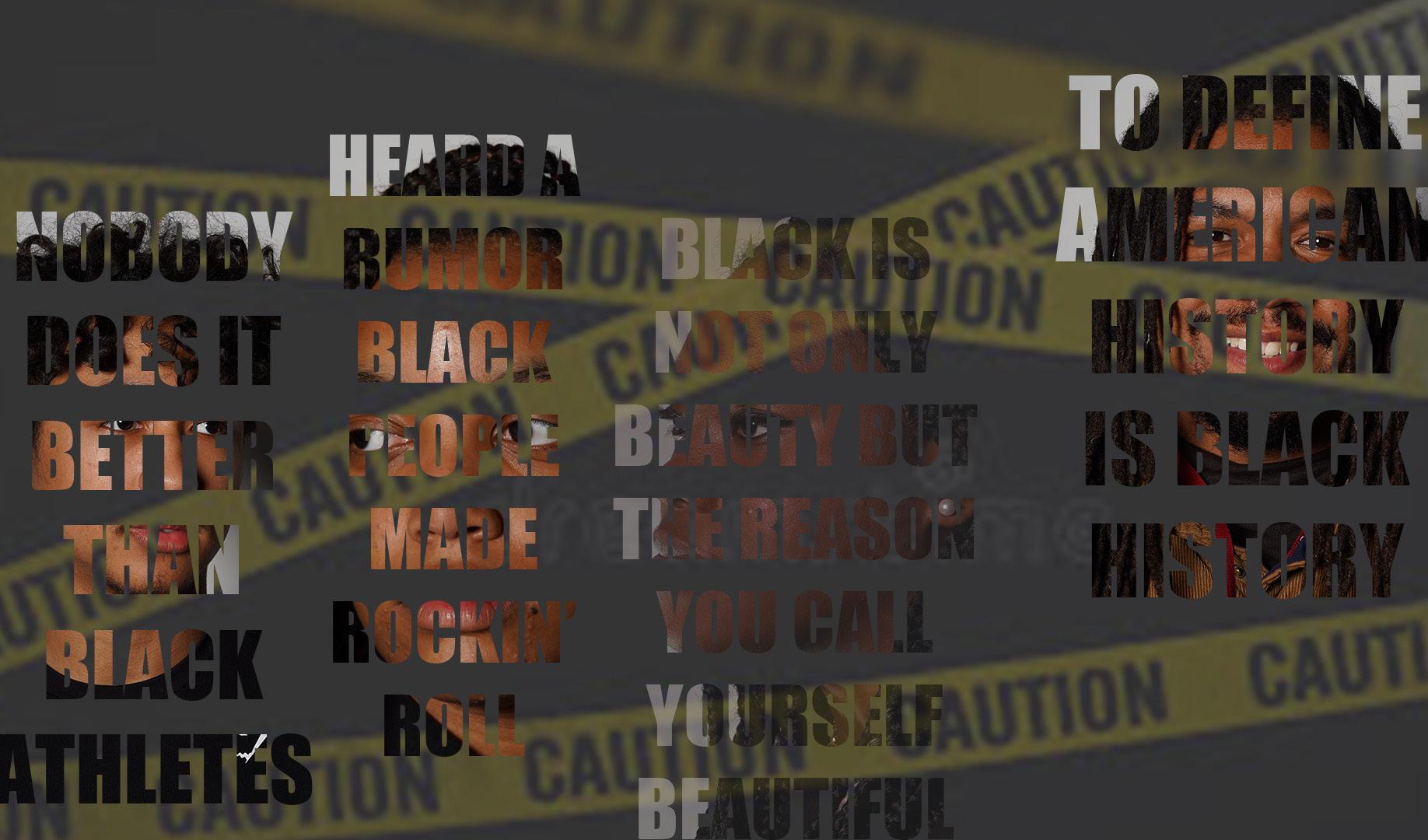
Book Discussion SEEKing Curiosity
by Lovissa Price
Often when I hear about self-help books, the image that comes to mind is some mystical guru trying to preach their path to enlightenment, but Scott Shigeoka’s SEEK takes a refreshingly different approach. Throughout this book, Shigeoka uses storytelling of their life experiences to demonstrate the concept that they are discussing and to exhibit the overall theme of being curious about each person’s journey. When the audience views their stories, we see examples of why this curiosity is necessary to come closer to understanding someone’s full character.
Remembering the People Who Built UVA
by Sebastian Laza
The Sophomore class experienced tours of either Women’s or Black history at the University of Virginia during their most recent grade-level experiences. On the Black History grounds tour, our guide mentioned the UVA memorial for the enslaved people that built the campus. The memorial commemorates these people by writing each one of their names on a circular wall surrounding a patch of grass with a water feature running in between the path and the grass. Sadly, many names are not recorded on the wall because their names could not be identified due to the lack of their record. In these cases, a line is etched into the stone to ensure they are still commemorated. The memorial concluded construction in the Spring of 2020, and a public dedication was held in April of 2021 which was then postponed a year due to the COVID pandemic.
During the tour, the guide spoke on Thomas Jefferson designs for the lawn which attempted to hide the enslaved laborers from the public eye. On the lawn, the largest houses are the professor’s buildings and the second largest are the student buildings, under the professor’s buildings in a basement hidden from view of the main lawn, were the slave quarters.
A few weeks ago, Dr. Graves hosted a discussion about this book and what role curiosity could play to transform human understanding in our lives. In the beginning of the conversation, we went around the room to introduce ourselves and tell the origin story of our names. What struck me was that each person had a unique anecdote that let everyone in the room get a sense of who they are, where they come from, and maybe even a slight sense of what has influenced them to become the person they are. This type of curiosity is just a small example of what Scott Shigeoka discusses in SEEK and, as it was in our discussion, it can be the beginning of forging deeper understandings and connections. Page 1
The Belfield Banter
In the book talk, we also explored the difference between surface-level familiarity and the actual understanding of people. When you think about the last time you saw someone with a loud opposing view of yours, did you talk to them to learn more about their opinions and their person as a whole, or did you turn away, immediately branding them as a “bad person”? Chances are, you did the latter similarly to the vast majority of people, myself included. In a case like this, Scott Shigeoka would argue that if you feel yourself immediately jumping to conclusions about a person’s character because of their opinions, it is your duty to learn more about their experiences.
Through practicing curiosity in your daily life, Scott Shigeoka and the STAB SEEK discussion group believe that it can help form a better understanding of everyone around you and transform dislike of someone into a compromise. By seeing all parts of a person, our disagreements always appear less atrocious, and it can help transform our perception of the world from gloomy to that much better.
Intersectional Activism within the Climate Movement
by Sonia Kamath
Over the summer, I had the pleasure of meeting Wawa Gatheru, an environmental activist and social media influencer. When I thought about the lens through which I wanted to examine the role of black voices in environmental activism, she was the first person I thought of.
Gatheru founded Black Girl Environmentalist in 2021, an organization focused on centering the voices of black women, and women more broadly, within the climate movement. The word ‘intersectionality’ came up countless times when I worked with Gatheru. As we think about the role black women and other minorities play in the climate movement, we need to understand and acknowledge that their unique perspectives come from a lived experience with the climate that is likely different from others in part because of the way they are marginalized. This is to say that issues of race, gender, and climate do not exist entirely outside of each other, but instead overlap (or intersect) significantly. So when we consider the need to diversify the voices we listen to in a social or scientific movement, it is not solely diversity for the sake of it, but instead so that we can create a more comprehensive picture of the impact these issues have on all people and not just the most privileged ones. Organizations like Wawa’s are aimed at cultivating opportunities for these intersectional narratives to be heard, which is not only empowering for those involved, but beneficially educative for those who are not.
Jefferson designed the lawn with a hierarchy of height where those at the lowest elevation were considered lesser than those higher up. Jefferson viewed the enslaved people as lesser than those on the lawn, and even if he said he didn’t like the institution of slavery, it doesn’t mean he didn’t use architectural discrimination to dehumanize the people who were forced to build UVA. The university understands the importance of remembering their inhumane history and takes responsibility for their past by commemorating the enslaved people who built it.

Model UN: From Barbie Land to the American Revolution
by Cadigan Perriello
Over the first weekend in February, while many settled in for some much-needed rest, a small group of students hopped on a minibus, piloted by Dr. Troy, to Blacksburg Virginia for Virginia Tech’s first-ever annual Model UN conference. With committees from Barbie Land to the World Health Organization, the conference included an immersive experience into various facets of history and international relations. Every Model UN conference includes three types of committees: Crisis, Specializes, and General Assembly. A typical Model UN portrayal would likely include a General Assembly, in which delegates assume the role of a country and debate about various political, economic, and social issues from the viewpoint of their country’s policies and powers. These committees work to pass a resolution to solve the issue posed at the beginning of the conference. Specialized and Crisis Committees typically surround more niche topics in which delegates could assume the role of a country or a fictional or historical character. In these committees, the delegates can use the historical and fictional powers of their characters to further their personal agendas or develop that specific world’s policies. At the Virginia Tech conference, for example, one St. Anne’s Belfield Student played the role of Ken in the Barbie Land Crisis committee in which delegates worked to solve various crisis updates happening throughout the fictional world of Barbie Land. On the historical side, another St. Anne’s delegate assumed the role of Patrick Henry in the American Revolution Crisis committee that got to dictate a new fictional outcome of the Revolution War.
March, 1, 2024 Issue IV
Page 2
Black Excellence:
Research Paper Excerpts on Madam C.J. Walker and Shirley Chisholm
by Taja Carey and Ty Enoch
As sophomores and juniors are writing their research papers, we wanted to include an excerpt from seniors Taja Carey and Ty Encoch’s 11th grade research papers that highlights Black excellence in American history.
“Students have the opportunity to do a deep dive and study a figure, event, or situation that has shaped American History. I think it is wonderful that Taja chose to focus her research on a black woman and learned about Madam C.J. Walker’s life and legacy.”
- Mrs. Sohne-Johnson
Madam C.J Walker was born Sarah Breedlove on December 23, 1867, in Delta, Louisiana. She was the first of six children born to Owen and Minerva Breedlove, who were former slaves. Walker experienced poverty and racial discrimination throughout her childhood and was orphaned by the age of seven. Despite this, she was determined to gain an education and attended school until the age of fourteen. Around 1878 she and her sister are believed to have moved across the Mississippi River to Vicksburg, Mississippi. After the death of her first husband, Moses McWilliams, she and her two-year-old daughter moved to St. Louis, where her brothers had established themselves as barbers. (Madam C.J.) Walker moved to St. Louis, Missouri, and worked as a washerwoman to support herself and her family. In 1904, she invented a line of African-American hair care products she sold doorto-door. In 1905 after the death of her brothers and her separation from her second husband, John Davis, she moved to Denver, where she lived from July 1905 to September 1906 when she began a year of travel to promote her new company. While in Denver, she married her third husband, Charles Joseph Walker. (Madam C.J.) From 1908 until early 1910 she lived in Pittsburgh, where she opened the first Lelia College of Beauty Culture to train Walker agents and “hair culturists.”(Madam C.J.) This marked the beginning of her career as an entrepreneur and philanthropist.
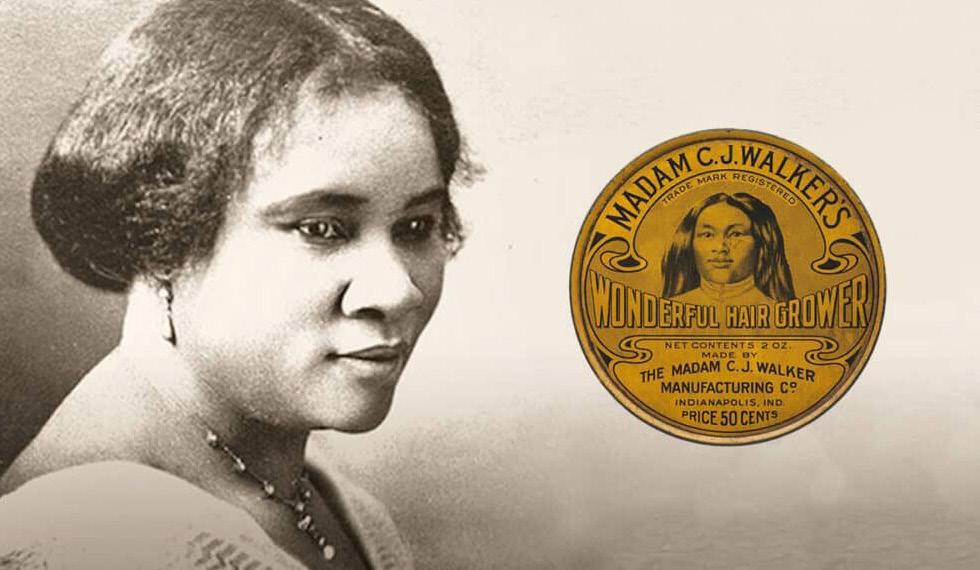
This specific crisis committee ended with complete tyranny in the new United Empires of America in which neither Britain nor the States emerged victorious in the war. While many view Model UN as an area simply for political debate, the experience of playing a significant role, using powers dictated to your actions, and debating with peers to resolve problems proves a far more exciting experience than most would expect.
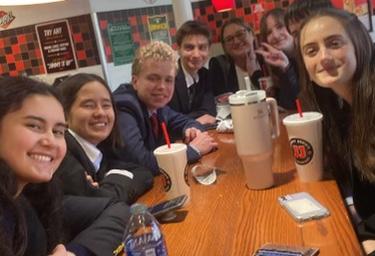
Not only did this delegation of 12 students take part in this hands-on educational weekend, they thrived as the first St. Anne’s Belfield School delegation to win an Outstanding Small Delegation award. With two individual awards and one delegation award, these students not only enjoyed a weekend full of debate, but they also showcased their abilities in these committees to a greater extent than ever before. The Model UN club plans, which always remains open to new members, to grow on this successful weekend by beginning to prepare for future conferences and improving debating and resolving skills. While learning how to use diplomatic skills and engage in public speaking, the Model UN club proves an amazing experience to get out of your comfort zone and develop analytical thinking skills in an exciting new environment. The club meets on Tuesdays during 5th period, is always looking for new students, and creates a welcoming and stress-free environment. While the Virginia Tech Conference proved beyond noteworthy for these students, it will also hopefully prove as a stepping stone into future conferences, awards, and personal successes.
Opinions Surrounding Super Bowl LVIII
by Ari Kastello
The Super Bowl kicked off on February 11th, 2024, and with it, a lot of controversy arose. The 49ers started with a ten-point lead at the half. Mahomes and the Chiefs responded with a touchdown and a field goal, making it a tie game. This Superbowl was the second to go into overtime in NFL history, the first being Tom Brady’s remarkable comeback win against Atlanta in 2017. The Chiefs won in overtime, adding a third Super Bowl loss to Kyle Shanahan’s coaching career: the second in overtime, and the second to KC. The game was not exactly the most exciting to date, but it was one of the most controversial.
Madam C.J Walker is known as the first self-made female African-American millionaire. She achieved this success through her hair care product business.
Page 3
March, 1, 2024 Issue IV
Walker developed her products to meet the needs of African-American women, who had limited access to beauty products. In February 1910 she moved to Indianapolis, Indiana where she built a factory and expanded her business. She was the first to recognize the untapped market of African-American beauty products. Although Madam Walker moved her residence to New York in 1916, the headquarters of the Madam C. J. Walker Manufacturing Company remained in Indianapolis for more than seven decades. (Madam C.J.) Walker traveled around the country, giving lectures, and demonstrations, and selling her products to Black women. She also employed thousands of African-American women as “Walker Agents” to sell her products door-to-door. Alice Kelly, her factory forelady, and a former school teacher. She continued to oversee the business and work in the New York office. Once in Harlem, she quickly became involved in Harlem’s social and political life, taking special interest in the NAACP’s anti-lynching movement to which she contributed $5,000. (Madam C.J) Walker’s success was due to her innovative product line, her sales strategy, and her commitment to empowering African-American women.
“Here’s an excerpt from Ty’s paper. He chose to conduct his research on the life and accomplishments of Shirley Chisholm.”
- Mrs. Sohne-Johnson
Throughout her entire political career, Shirley Chisholm was forced to contend with endless gender-based criticism from colleagues, political opponents, and even other Black leaders. In countless interviews men attempted to use her sex, size, race, and voice against her, calling her a “tiny yet torrid lawmaker” or saying she “looked slight at 96 pounds.” In response to this Chisholm says: “I delight in being able to turn the tables on him” (Gallagher, Julie. “Waging ‘The Good Fight’: ). She never backed down to anyone, no matter the political power they possessed or the authority they had over her. Chisholm developed the persona of a fearless bulldog that was devoted to making a change in her community and eventually the country.
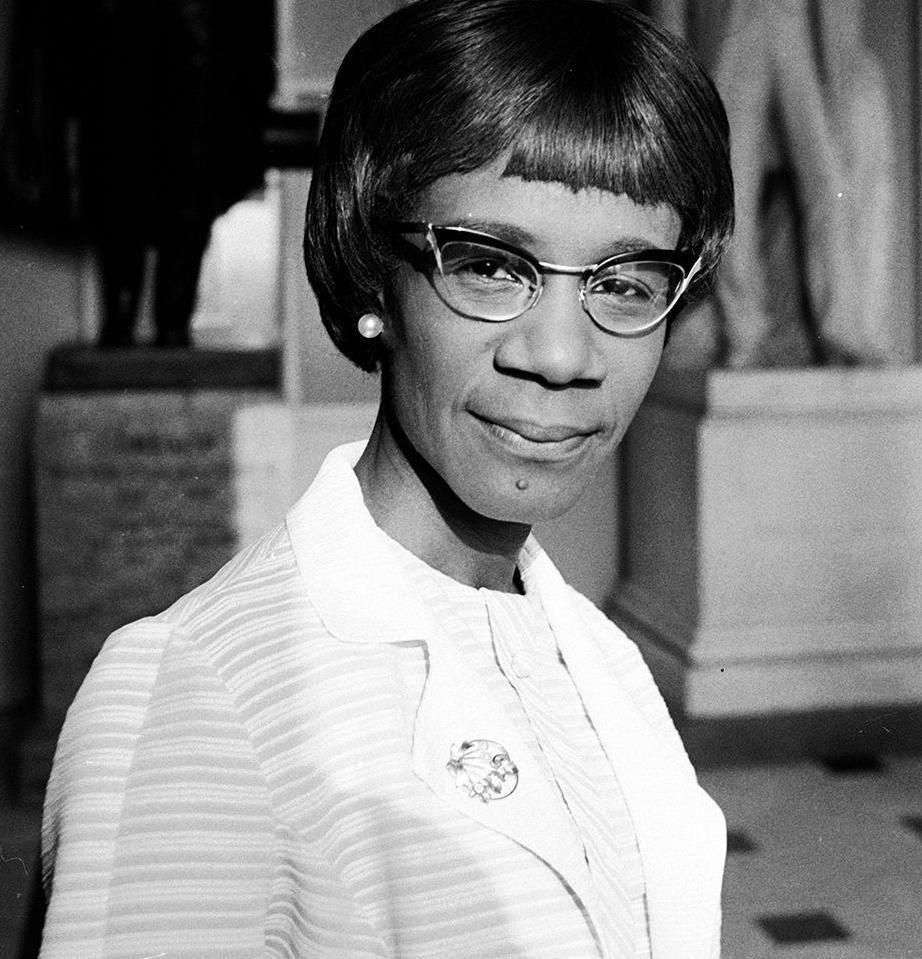
Conspiracy theories surrounded the game and many people thought that the game was rigged. Additionally, controversy centered around Taylor Swift and the effect she had on the NFL, as many NFL fans were offended by her whole 52 seconds of screen time. The halftime show was widely considered below-average by most of the people I talked to, especially compared to the last two years. Another incident that got a lot of attention was Taylor Swift’s boyfriend shoving Chiefs coach Andy Reid with lots of people believing he should apologize to the coach but in an interview with Pat Mcaffee, he dismissed the idea. All in all, this game was not the best Super Bowl of all time but one of the most memorable.

Winter Athletics Updates
by Rose Ryan-Byrne
Squash
Our coed varsity squad has had an excellent showing this past season. Competing at a high level, they brought down tough opponents such as Episcopal Academy, who they beat not once but twice at an away match and tournament. Additionally, the team showed an excellent home record, beating the previously national recognized squash program at Wakefield School twice at home. On top of that, the team came back to defeat Woodberry 6-3 during an emotional senior night. While the winter season is winding to a close, our team impressively places 11th at nationals this past weekend!
Swim & Dive
Both the boys and girls swim teams had remarkable showings this season, breaking 13 school records and finishing 3rd and 5th at the state championship meet respectively. The team competed at almost half a dozen meets throughout the season, and their hard work was evident in their times. The squad exceeded all expectations, breaking ten school records at the state meet alone, and earning first place in 100 fly in addition to the 100 free courtesy of Will Browne. Not to mention an incredible performance by Max Moore, becoming an all-american after his staggering finish in the 100 breast. While the team is graduating some incredible talent, the future of the program is bright, especially considering the outstanding performances accomplished by the younger members of the group. We can’t wait to see all this team will accomplish next year!
Page 4
March, 1, 2024 Issue IV
In the year of 1968, Shirley Chisholm made history by being the first Black woman to be elected to Congress. “I will fight until I can’t fight anymore. I don’t mind the challenges” (Gallagher, Julie. “Waging ‘The Good Fight’) is what she said after making history. Throughout Chisholm’s political career, she broke through the barriers that society had in place at the time. After four years in Congress, Chisholm continued to smash barriers perceived and real when she ran as the first black woman for President in 1972. “I have never had that kind of impact on me, as a human being” (“Shirley Chisholm .” Documentary). Her temporary campaign manager said, Chisohlm was a force to be reckoned with, her slogan “Unbought and Unbossed” (Momonegroh. “Shirley Chisholm’s ‘Unbought and Unbossed’) truly exemplified her as her own woman. Her philosophy, courage and ability to give the disenfranchised a voice displayed that this phrase was much more than a political campaign slogan, it was Chisholm’s way of life. In 1968, Chisholm was elected to Congress. In May of 1969, she proposed her idea of an Equal Rights Amendment (ERA) in a speech to the House of Representatives. She brought the issue of gender equality to Congress and called out its systematic rules that kept women in inferior rankings. “Tremendous amounts of talent are being lost to our society just because that talent wears a dress.” (Chisholm #46) While fighting for equal rights for women Chisholm also brought up abortion rights. Many leaders in the Black Power movement opposed birth control and abortion. Despite the criticism Chisholm faced due to these political views, she gained many supporters who loved what she was doing as a congresswoman. She also created interest groups with other feminists and Black leaders and used great tactics to appeal to her target audience. In a National Women’s Political Caucus (NWPC) meeting in July of 1971, Betty Friedan proposed “It is not impossible that a woman may run for president in 1976–and win!” (Gallagher, Julie. “Waging ‘The Good Fight’:”). In September 1971, she would officially run for president if she could raise the necessary funds. She made promises, specifically to African Americans, women, Native Americans, the poor, and veterans.
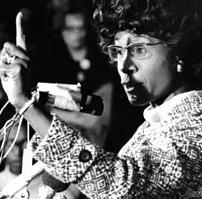
In Chisholm’s reflection on her memorable candidacy, she stated that in 1972 the United States was not yet ready for a Black person or woman to win the presidential election. Her running for president in 1972 displayed the societal changes that took place from when she first started in politics in 1951. Chisholm had been involved in politics for over 18 years when she ran for president, she saw the world of politics evolve in various ways. She led an evolution not just for women in politics but for Black people as well.
Girl’s Basketball
The girl’s basketball team had a truly incredible 2024 season, posting a 19-2 record and winning a conference championship. The team was electric on their homecourt, with a perfect 13-0 home record, beating tough opponents like Covenant and Mercersburg. Not even beginning to mention their outstanding performances in the postseason, dominating the LIS tournament and securing the league title. Exceptional performances by the entire team, with three players, Keegan Morris, Sophie Gangemi, and Zoe Burruss, achieving All-LIS honors, with Sophie Gangemi being named the league player of the year. The team has already pulled off an incredible season, and we can’t wait to see all that they will continue to achieve in the state tournament!
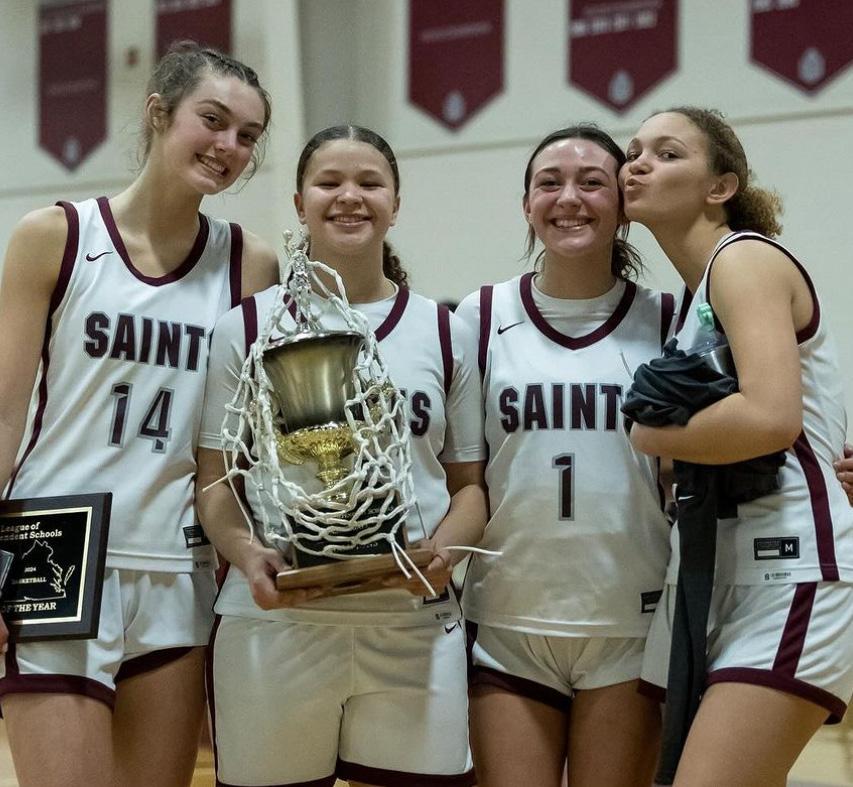
Boy’s Basketball
The boy’s basketball team has had a phenomenal season. The team achieved an impressive 23-3 record, with a perfect 11-0 home record. The squad went into the season with a difficult schedule, facing off against other top teams with the likes of Miller and St. Christopher’s, but became seemingly unstoppable with their elite outside shooting and passing. With the team consistently maintaining a top spot within the Virginia state rankings, one would be hard pressed to call them anything other than a top contender for that state title this year. We wish them all the best for the state tournament, and are quite eager to see more exciting performances from the team!
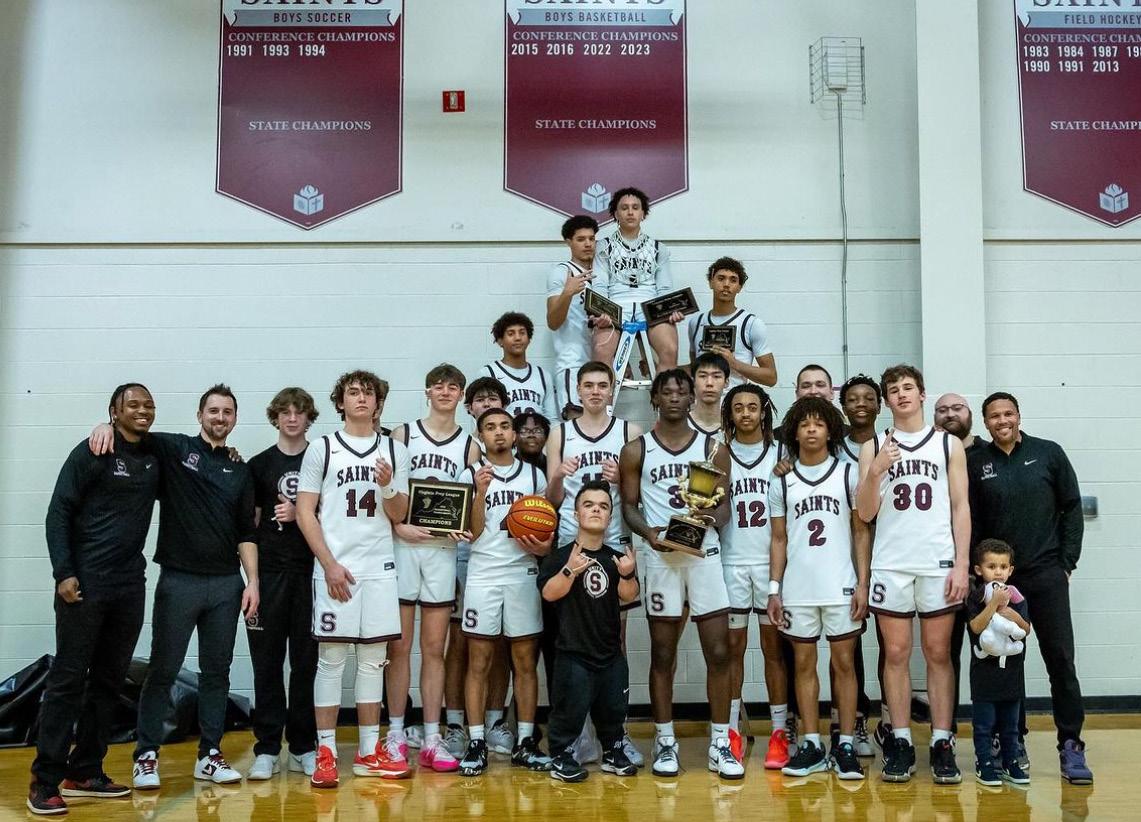
Page 5 March, 1, 2024 Issue IV
Black Excellence Playlist
by The Belfield Banter Staff

“TELEKINESIS”
by Travis Scott, SZA and Future

“Dandelions” by Ruth B.


“The Color Violet” by Tory
Lanez

“Work Out” by J. Cole
The Grammys and Its Racial Roots
by Izzy Sanok
“XO” by Beyoncé “We’re All Gonna Die” by Joy Oladokun and Noah Kahan

“HISS” by Megan thee Stallion

“ARE WE STILL FRIENDS?” by Tyler, the Creator

“Summertime” by Louis Armstrong and Ella Fitzgerald


“I’ve Got My Love to Keep Me Warm” by Billie Holiday

“Give Me One Reason” by Tracy Chapman

“Seek and Destroy” by SZA
Artists, new and old alike, attend the Annual Grammys award show in anticipation to hear their names called and music-streamers support and, more often than not, deeply criticize the academy for their outlandish and striking award choices. From sexual assault charges to transparent racial bigotry, the academy’s history with race and gender is beyond rocky. Since its inception, the Grammys have strategically and blatantly segregated artists, damaging standards for Black creatives. It wasn’t until 1974, the 15th Grammys, that a Black artist won Album of the Year, Stevie Wonder with his iconic and defining album “Innervisions”. Additionally, defining artists of our time, like Beyoncé and Kendrick Lamar, are actively robbed year after year in the major categories. Although in the past three years the diversity of live performances and categorical nominations has skyrocketed, it’s still vital to acknowledge the deeply rooted racism of the program.
Initially, the winners of televised categories have massive jumps in streams post-show, they receive new promotional opportunities and are noticed by influential producers, music executives and artists alike. Thus, they not only have a chance at winning an award but also make a big leap up the music industry ladder. However, Jay-Z, this year’s winner of the Dr. Dre Global Impact Award, enumerated in his speech the lengths to which the academy continues to rob Black artists in categories like Album of the Year, Record of the Year, Song of the Year and Best New Artist. And even when Black creators do win, they’ve fought and worked with a vigor unknown to many of their white compatriots. It’s difficult to grasp how Black artists like Victoria Monet, this year’s Best New Artist, are just now being recognized and popularized when they’ve been working and fighting for recognition within the industry for more than a decade. And to return to Jay-Z’s eloquent and truthful speech, the academy has proven time and time again that Black artists can only win big in categories that’re continuously not televised nor validated by the general public.

Page 6
March, 1, 2024 Issue IV
Trump, Ballots and the Supreme Court
by Carter Kelly
Colorado has attempted to ensure former President Donald Trump’s name does not appear on the Republican primary ballots. But this is far from the most interesting event recently taking place with Trump’s name on it. Questions around the authentic meaning of the 14th Amendment have started trouble in the Supreme Court as some wonder how immune the president is—or should be—to that Amendment or if he did violate it.
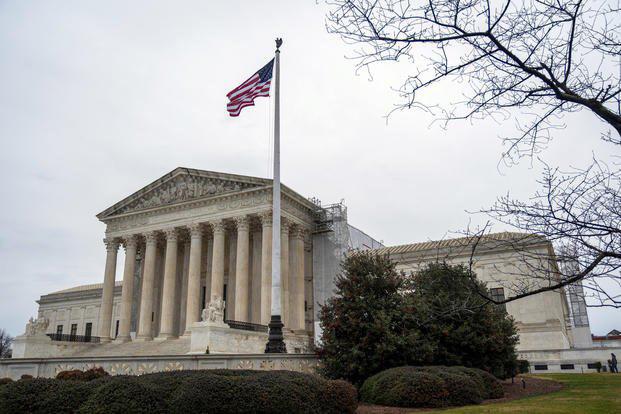
While some state that the case is cut and dry: the presidential immunity should be extended to the former president, others believe that his immunity should have expired at the end of his term. The primary source of the controversy was sparked by the January 6th insurrection that would seem to violate the 14th Amendment’s section III which states the following: “No person shall … who, having previously taken an oath … to support the Constitution of the United States, shall have engaged in insurrection or rebellion against the same, or given aid or comfort to the enemies thereof.” With the belief that this Amendment was violated, the Colorado Republican primary moved to remove Trump from the ballot. This action quickly ushered in the Supreme Court—it is important to remember there are also many other cases involving Trump at the moment one of which would have him accused of 91 felonies, and with the opportunity to set a new standard for the country on how immune the president actually is, their ruling is extremely important for Trump and likely future presidents as well. With this case currently underway and the recent rulings against Trump in New York, the following weeks could either allow the former President to run again, or bar him from office.

Beyoncé, with 32 total Grammys under her belt, has only won 4 Grammys without “R&B” or “Urban” in the title, categories that are rarely ever televised. Jay-Z, Tyler the Creator and many black creatives have witnessed and spoken up about the racial segregation of artists within award shows but with the Grammys it’s incessant and irrefutable. The system itself proves to be bigoted and systemically corrupt, there’s no easy way around it. A more diverse cast of performers doesn’t make it magically morally sound nor racially equitable.
I’m an avid consumer of music and entertainment and do find shows like the Grammys so very entertaining. However, I’ve found in recent years that I’ve become less entertained and more infuriated by the standards upheld by said productions. Musical artists have guided me and millions of others in developing our own personas. They’ve altered the ways in which we view the world all because of their craft because that’s what music is: craftsmanship that influences introspection and extrospection alike. So, to reduce all of that complex psychological impact and artistry to a poorly made piece of gilded plastic is disheartening. Thus, when a system, that’s built off of external validation from a heavily biased committee, continually refuses to award Black creators, how can racial equity ever exist within the industry? That’s a question similar to those posed by Jay-Z: questions which lack definitive answers. Viewers can feel helpless when it comes to issues like this, for we’re only onlookers and streamers in the lives of artists. How can we make a difference? To answer that, I say: continue to listen and appreciate the voices who aren’t represented or showcased on the TV. This doesn’t mean don’t listen to Billie Eilish or Taylor Swift- I’m a hardcore swiftie forever and always- but open your eyes, mind and heart to the artists and creative people who don’t usually receive the recognition they deserve. And this sentiment goes beyond music and streaming. In order to change a deeply flawed system, seemingly ordinary people have to take a leap and open themselves up to the non-standardized nuance waiting for us beyond the fog of societal expectation. In conclusion, listen to and support artists of all genres in spite of their categorization, despite their wins and losses, in order to make an impact no matter how small it may seem.

Page 7
March, 1, 2024 Issue IV
Editor’s Note
by Lyra Stewart
Dear Readers,
Happy Spring break and end of Module 4! I’m delighted to present our Black History Month issue of The Belfield Banter.
This issue, we have some very impressive articles from our staff including Cadigan Perriello’s article on Model UN’s outstanding performance at Virginia Tech, Rose Ryan-Byrne’s update on STAB winter athletics, Lovissa Price’s article on the book SEEK by Scott Shigeoka, Sebastian Laza’s piece on the UVA memorial, Sonia Kamath’s article on the intersectionality of activism within the climate movement, Izzy Sanok’s article on the racial roots of the Grammys, and excerpts from Ty Enoch and Taja Carey’s 11th grade research paper highlighting two influential people of American history. Last but not least, we have our staff’s playlist of our favorite black artists as listening to our playlist is the best way to finish off Black History Month!
Our goal with this issue was to not only share what’s going on around our school, but to highlight black excellence in American history, pop culture, and even at UVA only a few blocks from school. Highlighting the history and excellence of people who are more often to be overlooked is this issue’s goal, and I am proud of the articles written by our staff that accomplish this goal. With research paper season beginning for sophomores and juniors, we cannot wait for the fascinating topics chosen this year. We have included two excerpts from past research papers which were written by Ty and Taja on important figures in American History.
As I assume many of us are, I cannot wait for this upcoming week off, and I hope we all find some relaxation and fun while away from school. And as we head into break, I hope everyone has a great week off and start to the spring. We are always accepting articles via email. If you are interested in writing for the Belfield Banter, please reach out to Izzy or I as we would love to include your voice in our next issue. Please email lstewart24@students.stab.org and isanok24@students.stab.org!
All the best,
Lyra
Stewart and The Belfield Banter Editorial Staff


Page 8
Lyra Stewart, Senior Editor Rose Ryan-Byrne, Managing Editor Henry Dozier, Assistant Managing Editor Sebastian Laza, Assistant Managing Editor Cadigan Perriello, Associate Editor Sonia Kamath, Features Editor Lovissa Price, Assistant Features Editor Sofia Tache, Column Editor Carter Kelly, Assistant Column Editor Hadley Booth, Co-Sports Editor Annie Leahy, Co- Sports Editors 2023-24 Staff of The Belfield Banter Banter Publications Editor-in-Chief Izzy Sanok March, 1, 2024 Issue IV artwork by Taja Carey



















